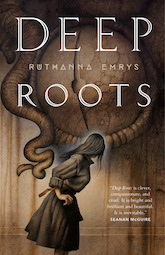Winter Tide, Ruthanna Emrys’s accomplished and astonishing debut novel, was an intense and intimate subversion of the Lovecraftian mythos, told from the point of view of Aphra Marsh, the eldest of two survivors of the United States’ genocide of Innsmouth. In Winter Tide, Aphra made reluctant common cause with FBI agent Ron Spector (though not with his suspicious colleagues) and accidentally accreted a family around her. Winter Tide is a novel about the importance of kindness in the face of an indifferent universe, and I love it beyond reason.
I may love Deep Roots even more.
Aphra and her younger brother Caleb carry the scars of internment camps and genocide with them. Aphra’s come to terms—hard-won, a bitter peace—with the government that destroyed her people on land. Enough, at least, to reach out to Spector and ask him to help her and her “confluence”—a family of choice, bound together by magic—when they visit New York in search of distant cousins who may have escaped the Innsmouth genocide by virtue of their more distant relationship. Aphra wants very much for her generation not to be the last of the People of the Water on land, and to rebuild a community at Innsmouth.
Buy the Book


Deep Roots (The Innsmouth Legacy)
She, her Japanese-American adoptive sister Neko (with whom she survived WWII in internment camps in the desert), Caleb and his lover, black former FBI undercover agent Deedee, Audrey, Charlie, and Catherine Trumbull—still readjusting from having her body borrowed by a Yith—have come to New York to seek Frederick Laverne, a young man who they believe may be one of Aphra’s long-lost relatives. But when they find his mother, Frances (another of Aphra’s relatives), she tells them he hasn’t been home in days. Aphra, unwilling to leave one of her kin missing when she has so few left—apart from the elders who dwell beneath the water—appeals to Spector for aid. But Spector is unable to help them without invoking the resources of the FBI, and those resources include the same suspicious agents who wanted to arrest Aphra and her confluence as traitors in Winter Tide.
Despite their mutual antipathy and the thoughtless bigotry of Spector’s colleagues, they discover that Freddy Laverne has found a place for himself—the first place he’s ever felt that he belongs—with a gathering of Outer Ones, also known as meigo, and their fellow-travellers. The Outer Ones are different from the Yith, but they’re advanced in ways that neither Aphra nor Spector’s FBI colleagues are really prepared to deal with. And they present, in a well-meaning albeit arrogant fashion, particular dangers for Aphra herself.
The Outer Ones live for conversation and debate, but their debates about how to interact with humanity in the atomic age have grown divisive. Aphra fears that any impulse of theirs towards intervening in human affairs will only stoke self-destructive paranoia among human governments. When the Outer Ones’ gathering splits, exiling the anti-interventionist faction, Aphra knows she has to do something to prevent disaster, even if that means putting her own future at risk.
Deep Roots is a glorious, quiet, intense novel about interacting with power from the margins; about the responsibilities of knowledge and the ethics of self-determination. It’s a novel about grieving the fact that you’ll never reclaim a heritage that’s yours by right, and making your peace with it anyway; a novel about the family you build anew out of the roots of the things you lost.
Deep Roots is a novel about love, about connections, about history and memory and vulnerability. But it’s rooted (yes, rooted) in love and connection. Where Winter Tide only showed us Aphra’s point of view, Deep Roots gives us occasional interjections from other members of Aphra’s confluence (among others), and demonstrates for us how they’re intertwined: part of a family that Aphra’s brought together, but also connected to other communities, other families (either born or chosen) themselves.
The characters are the novel’s heart. Ron Spector introducing Aphra and her friends to his Yiddish-speaking Tante Leah at her boarding house exposes us to more layers of his character, with his relatives asking when is he ever going to bring a nice girl home even as we know that he and Aphra’s friend Charlie are lovers. Each of the characters gives us a different view on kindness and connection: Obed Yringl’phthgn Marsh, Aphra’s grandfather, one of the water-dweller elders, trying to protect and comfort his still-landbound granddaughter; Deedee bringing Caleb to a Harlem dancehall; Aphra’s elder S’valk, thousands of years old and once host to a Yith, forming a connection with Catherine Trumbull: despite the gulfs that separate them, more brings them together.
Deep Roots is a novel that makes me gasp and cry. It makes me feel deeply. And it makes me think. I love it. (Perhaps I love it too much to see any flaws). I admire it. It’s astonishing and ambitious and amazing, a novel that takes me aback at its beauty and the strength of Aphra’s water-born metaphors in Emrys’s prose. It builds on Winter Tide‘s striking accomplishment to become both a natural continuation and something more, worthy in its own right.
I recommend it wholeheartedly.
Deep Roots is available from Tor.com Publishing.
Read an excerpt here.
Liz Bourke is a cranky queer person who reads books. She holds a Ph.D in Classics from Trinity College, Dublin. Her first book, Sleeping With Monsters, a collection of reviews and criticism, was published in 2017 by Aqueduct Press. It was a finalist for the 2018 Locus Awards and is nominated for a Hugo Award in Best Related Work. Find her at her blog, where she’s been known to talk about even more books thanks to her Patreon supporters. Or find her at her Twitter. She supports the work of the Irish Refugee Council, the Transgender Equality Network Ireland, and the Abortion Rights Campaign.










